Guide: Finding Low Competition Keywords
Join the 1,000+ brands that trust us for their link building.
Welcome to SirLinksalot’s SEO Round Table Office Hours.
In this series, we reply to questions from members of our Facebook Group, SEO Round Table, with video responses in an effort to help them become stronger, more capable SEOs.
If you’d prefer to watch the video – skip to the end of this article.
Enjoy!
Introduction – How to Find Easy Keywords
You might know how to do the basics of keyword research already. When you want to find competitive keywords, you are just uncovering each particular keyword or keyword phrase that you want to go after for an article that targets specific Google SERPs or a target audience.
But what if you want to find keywords that are relatively easy to rank for? Targeted keywords which do not have a lot of competition, and for which you are more confident in being able to rank and generate traffic for? We call these low competition keywords.
Today, I’m going to show you guys how to find low competition keywords (also known as long-tail keywords). This is pretty much the only method that I’m using to find low-competition keywords to go after when I’m doing keyword research. This tutorial is a good primer for keyword research as part of a broader SEO analysis (and before you start targeting high competition keywords with greater keyword difficulty).
Nick already showed us a method for allintitle keyword research. Everyone’s going to have a little bit of a different method for finding keywords given their goals. This is just my particular favorite method for finding low/high search volume, low competition keywords because it is very quick and cheap (used to be free but not anymore!).
Let’s go hunt for long-tail keywords!
Keywords Everywhere Browser Extension
To do this method of keyword research, you’re going to need two browser plugins for search engines.
The first one that you need is called Keywords Everywhere.

When you go to their website, you can see at the top that it says, “Keywords Everywhere is a paid tool.” Up until about two weeks ago, this was not the case. It used to be free! When I first heard this news, I kind of freaked out… as did a lot of other people.
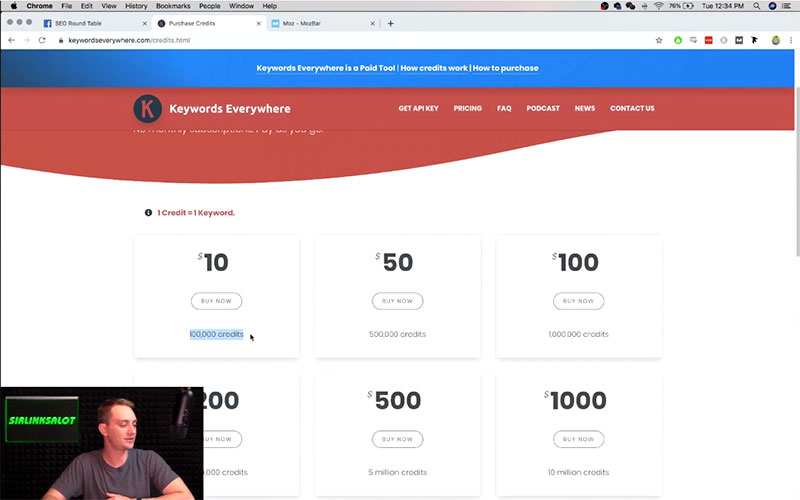
But if you go look at the pricing, you can see that $10 gets you 100,000 credits. You don’t know what credits are right now, but 1 credit gives you information about 1 potential keyword.
Every search that you do uses about 30 keywords if you leave the settings turned on that returns additional related keyword opportunities. You can turn that off so you just do one keyword per search. I just leave it on.
So if you have 100,000 credits and 30 keywords per search, that $10 will give you over 3,000 searches. That’s a lot of keyword targets! So yes, this tool is now a paid tool, but it is SUPER cheap.
For full transparency, we are not affiliated with this company in any way (and you can see our link to them is not an affiliate link). This is just a tool that we really like to use, and it’s extremely cheap. We paid $10, and that will probably get me months of keyword research.
So after you decide how many credits you’re going to buy, go ahead and download it. It’s a Google Chrome extension, meaning that it’s a program that hooks on to your Google Chrome browser. You can use this extension on Firefox too, but I think the second extension that we’re going to be using is Chrome only.
Mozbar Chrome Extension
The second Chrome extension that you’re going to need to get is MozBar. This one’s completely free. You literally just hit the download button and install it.
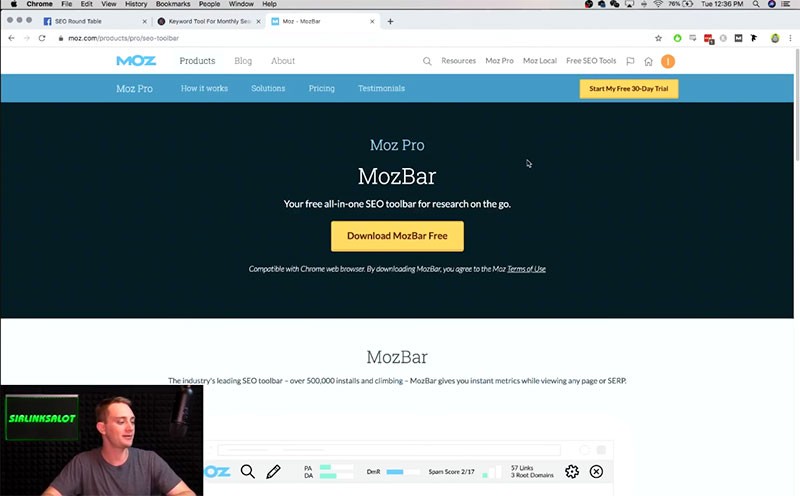
You can download MozBar here.
So after you’ve got both of the extensions installed, go up to the top right of your browser and turn them on.
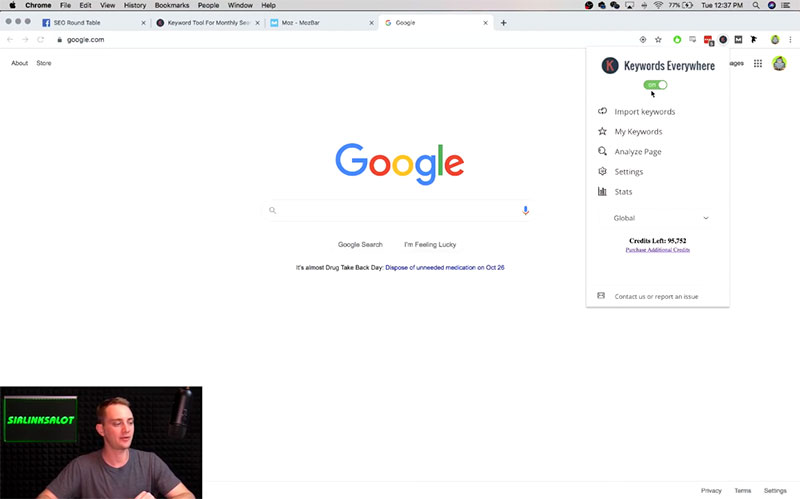
You can see that I have Keywords Everywhere turned on, and I’ve only used 5,000 of my 100,000 credits so far. I’ve still got a long way to go on that $10.
But since it’s not completely free anymore, you’ll probably want to turn it off when you’re not using it to avoid using your credits for every Google and Youtube search you do in the search engines.
When you turn on MozBar, you’ll see that you need a Moz account to log in. This is free as well, and you can sign up here.
Once you’ve got both plugins turned on and you’re logged in to your Moz account, you’re good to start looking for low competition keywords!
Finding Low Competition Keywords
First, you need one or several seed keywords to start finding low competition keywords. After you’ve made sure that your keyword research tool (Keywords Everywhere) is installed and turned on, it’s time to begin searching. We’ll begin by entering just one primary keyword into the Google search bar: “gaming chairs.”
For those of you who don’t know this about me, I’m really into video games… I probably waste a little bit too much time with this stuff. A bunch of gamers promote gaming chairs, so I figured we’d look into it.
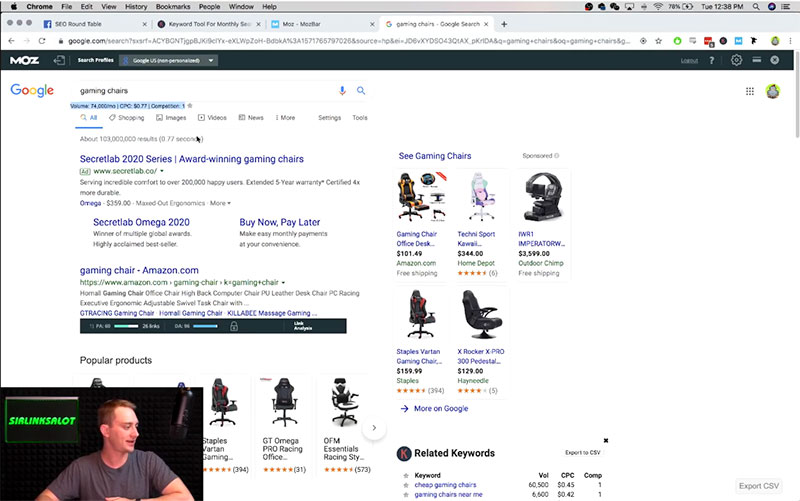
There are a couple of things you’re going to see right off the bat. You can see the volume, the cost per click, and the competition right by the keyword. All this data is being automatically updated by Keywords Everywhere.
The main thing that I’m looking at here is the monthly search volume (i.e. organic search traffic). Monthly traffic is one of the primary indicators telling you how competitive a search phrase will be to rank for.
In the case of this particular phrase match (“gaming chairs”), the organic traffic volume is 74,000. This is one of the very high volume keywords I consider to have “high keyword difficulty”.
Competitive keywords like “gaming chairs” will be difficult to rank for. Highly competitive keywords tend to fall under the category of fat head keywords, which are typically popular search phrases with 3 or fewer words (that may indicate buyer search intent).
In general, high search volume equals high competition. This is simply because people flock to where they can make the most money. You can still make a lot of money off low search volume terms, and they will also be much easier to rank for.
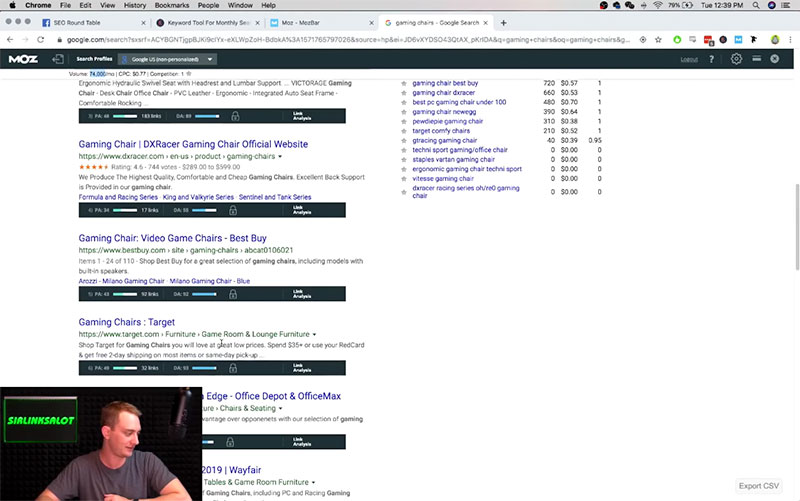
The other thing you’re going to notice is that we’ve got these little black bars below every site, and they’re giving us a quick PA and DA (Moz metrics for Domain Authority and Page Authority) of each of these URLs that are showing up on the SERP. The Mozbar DA is like a keyword difficulty metric when applied to keyword research.
We’re not really too big of fans of Moz and their metrics (we usually just use Ahrefs). Ahrefs has an extension as well, however, we’re using Mozbar for this because it’s free and because we just need to make quick, general judgments about the sites that pop up on the SERP (the competition).
First, we saw that the search traffic for this keyword was 74,000. We’re pretty much going to know it’s high competition already, but scrolling down and looking at the metrics of these domains you see DAs of 96, 96, 89, 55.
These are all high domain authority sites meaning that it will take more to outrank them. High authority domains tend to receive high quality backlinks from many referring domains.
I don’t see a single low DA site on the front page. With Mozbar, you want to either see that there is at least one low DA site on the top-ranking pages.
Of course, it will mean the competition is even lower if there is more than one. Having one or more low DA sites on the first page will let you know that it will be easier to rank for that term.
When I say “low” DA, I mean something that’s lower than about 30. That number might change a little bit depending on you, how good you are at SEO, what kind of budget you have, and so on. For you, that number might only be 15 or 20.
So in general, I look for sites on page 1 that are lower than 30 or 40 DA. You can see there are none like that on the top-ranking pages of this Google SERP.
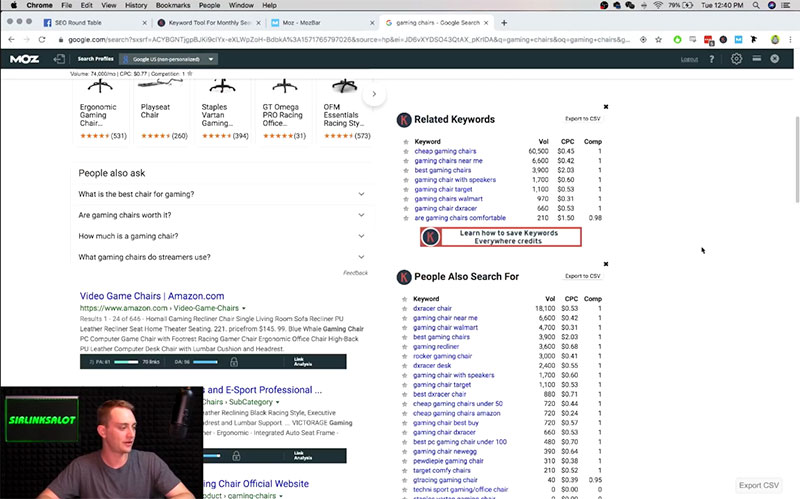
Moving on, you can see these related keywords on the side of the screen. These are also being dropped in by Keywords Everywhere along with their search volumes.
You’ll find all the keywords of relative interest listed in these information boxes on the right. This is a very quick way to get some additional keyword ideas (since “gaming chairs” was a very competitive keyword).
Also, look at the titles of the URLs (blue clickable text of the pages ranking on page 1) that are already ranking on this page for even more keyword ideas. Here we can see “video game chairs.” We could look at that one more in-depth if we wanted to.
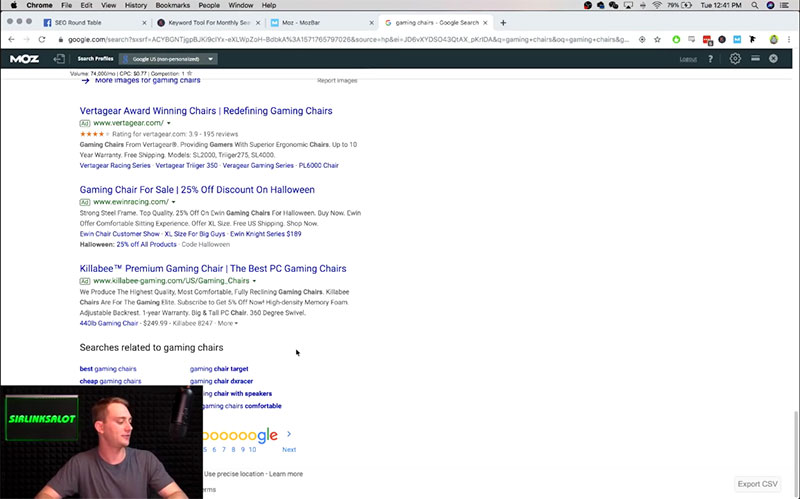
The last place we’re looking for keyword ideas is down at the bottom of the page. Keywords Everywhere used to give the search volumes here as well, so maybe I need to mess around with the settings to get them to show up again.
But this is another great place to look for other seed keywords to research. Here we can see “best gaming chairs,” and “cheap gaming chairs.”
Let’s go ahead and check out “cheap gaming chairs” to see if it’s one of the low competition keywords.
This one has 60,000 search volume. Still too rich for our blood. Let’s look for a keyword with a little bit lower search volume. This one will most likely be high competition as well with a high search volume like that. Maybe we’ll find a high volume, low competition keyword.
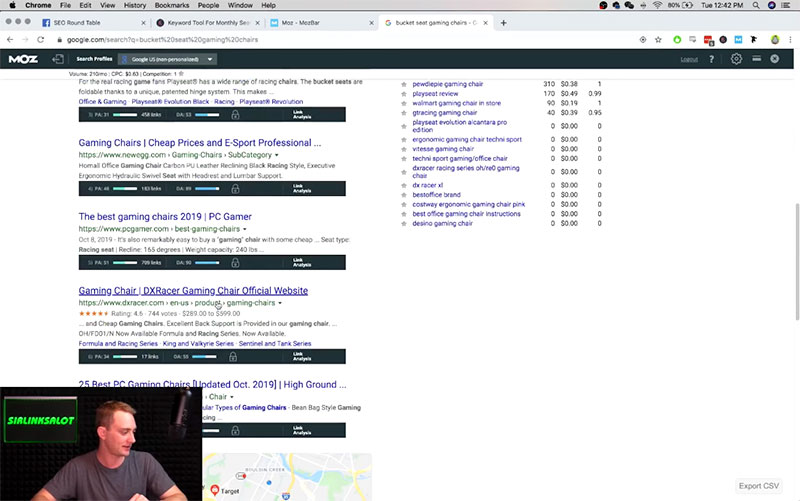
Here we have “bucket seat gaming chairs.” It’s only got a search volume of 210, and right off the bat that pretty much tells me that this one’s going to be a lot more accessible. This search phrase is starting to head in the direction of “long tail rankings”. Long tail keywords tend to be unique, low competition keywords with more than 3 words.
So now we’re going to click it to inspect the Google SERP with Mozbar. The first site has a high DA, but scrolling down we have one in the 30s (relatively low keyword difficulty). 39 isn’t super low, but it’s lower than 55, 89, or 96.
So this keyword has a lower search volume, but there are still no sites on the front page with a very low DA which is telling me that the competition still might be a little bit high for this keyword. Even though relatively speaking, this is one of the low competition keywords in the niche, it’s still not as easy as I’d like it to be for this guide on finding low competition keywords.
Let’s go ahead and keep looking for other related search terms with keyword modifiers:
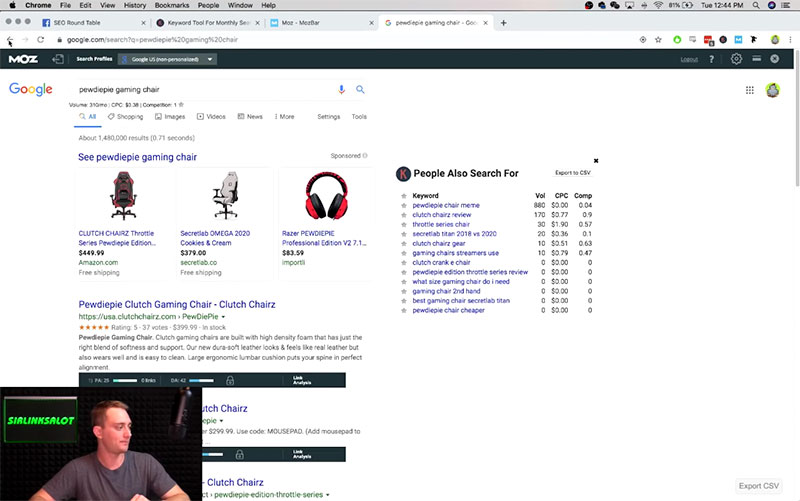
I found a keyword in the suggestions: “PewDiePie gaming chair.” I know who this is since I’m into gaming; you might know who he is too. I think he’s the biggest streamer on YouTube.
Anyway, the search volume for this keyword is 310 per month. Inspecting the SERP with Mozbar, you can see that there aren’t any high DA sites right away. There are some 40’s and 90’s, and then we have one that is 17.
That’s a low DA for sure, and the top of the page isn’t filled with super high DA URLs like it was on some of the previous searches. This means that for this SERP, you don’t necessarily need a lot of links (or high authority) to get on page one of the search results.
Let’s go ahead and do one more.
Through the related keywords suggestions from Keyword Everywhere, I found the keyword “reclining gaming chair with footrest” with 480 monthly search volume. This one has high “search intent”.
Scrolling down you can see that the first page of the search results has a really high DA. But then you get to number three, and we’re already getting to these very low DA sites in the 40s and 30s.
This could be one of the low competition keywords that I would potentially go after which shouldn’t be too difficult to rank for. You can definitely find easier keywords than this, but this one also has a pretty hefty search volume. So we ended up finding one of the relatively high volume, low competition keywords (some of the best keywords you can find). A nice combination!
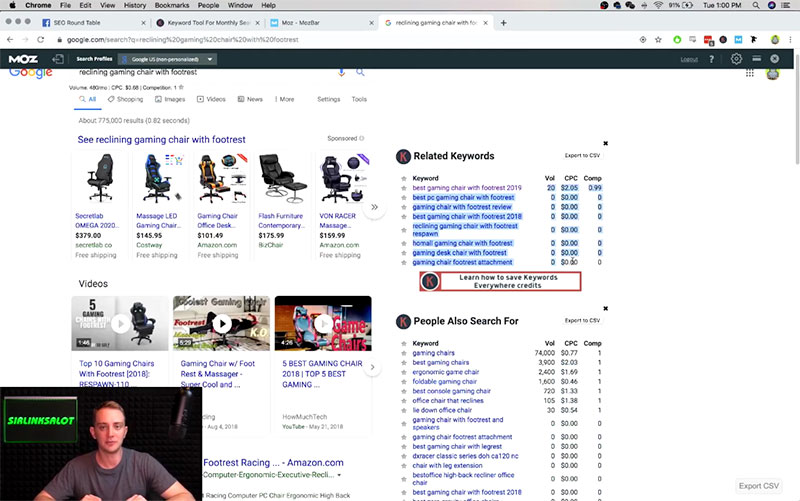
All of the searches that we did were for competitor keywords that had search volumes in the hundreds. You can see in the Keywords Everywhere suggestions that there are a lot of keywords that are returning zero search volume, 20 search volume, or something very low.
Your first thought might be that these terms are worthless, but you couldn’t be more wrong!
Just because they say zero search volume does not mean that they really have zero search volume. These search volume estimates are not always accurate – even if you’re looking in Google Keyword Planner.
You can actually get good traffic and make good money from zero search volume terms and low keyword competition (monthly traffic below 100). Not only can you get money and organic traffic from them, but they will generally take much less time and money to rank for. You won’t need to invest that much into link building efforts.
So don’t skip out on terms because they have low search volume – these can be some of your biggest low competition keyword winners! You can find related keywords that will be fruitful too.
Final Thoughts on Low Comp Keywords
If you want to get deeper into the keyword research and finding low competition keywords, with a few clicks you can always hop in Ahrefs and actually pull up some of these low DA sites to see how many other sites are linking to them, how relevant their links are, etc.
That will help you gauge the competition a little bit further, but we normally don’t do that out of laziness. Just browsing search results with low DA sites from Mozbar, I know for a fact I can get on page 1 for that potentially low competition keyword without any problems.
This is pretty much the only thing that I’m currently doing to find low competition keywords. I do this very often, and I’ve had really good success with it. Sometimes they may have high search volume, but it’s okay if they do not.
Everything you’ve learned from this guide is a good introduction to finding high competition keywords, which I am sure you’ll eventually start doing. I know that if you follow this method (and maintain your link building efforts), you’ll be finding and ranking for low/high search volume, low competition keywords in no time. Then, all that’s left is making sure you’re part of a good affiliate program to make some money!
If you have any questions, go ahead and ask in the comments or in our Facebook Group. Thanks for reading and watching!
How to Find Low Competition Keywords Video:
 Article by:
Article by:
Chris Tzitzis
Hey I'm Chris, one of the founders here at SirLinksalot. I'm into building internet money machines (affiliate websites) and specialize in building backlinks. Find out more about me and my link building team.
 Questions or Comments?
Questions or Comments?
We are active in our Facebook Group seven days a week and would love to hear from you. Ask us questions, learn from other group members, and share your knowledge.
Related Posts
Ready To Start Building Your Rankings?
Your link building journey to the top of Google starts today!
Apply for Managed Link Building to get a free analysis and game plan, or order backlinks a la carte.
Link building services that work.


